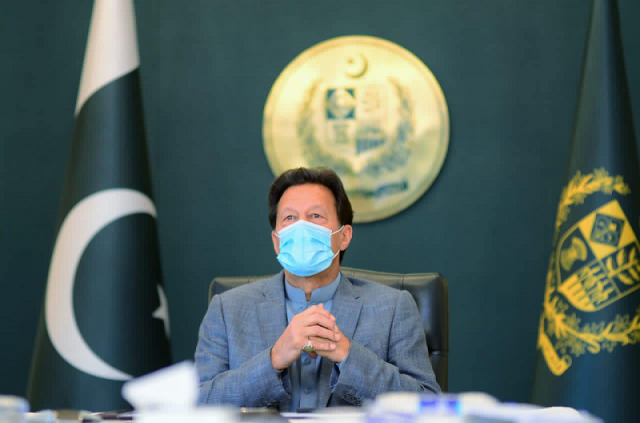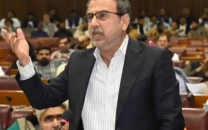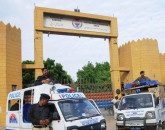Imran unfolds road-map for recovery from Covid
Premier virtually addresses 10th D8 leadership summit; calls for enhanced trade activities

Prime Minister Imran Khan presented on Thursday a five-pronged road-map before the Developing-8 (D-8) countries, urging mobilisation of finances, intra-trade, youth engagement, technological development and enhanced cooperation in health, sports sectors and during natural disasters.
Imran also urged the D8 countries to develop a strategy to deal with the economic and health crises brought upon by the Covid-19 pandemic, stressing that coronavirus vaccine should be treated as a global public good and its production should be enhanced to save lives.
The prime minister addressed a meeting of the D8 organisation for economic cooperation, which comprises Bangladesh, Egypt, Indonesia, Iran, Malaysia, Nigeria, Pakistan, and Turkey via a video link. The 10th D8 summit was hosted by Dhaka.
This year’s theme of the conference was ‘Partnership for a Transformative World: Harnessing the Power of Youth and Technology’. While proposing his five-pronged road-map, the prime minster explained Pakistan’s endeavours to realise the vision of D8 in these testing times.
One, Imran said: “We must mobilise financing and resources to recover robustly from the economic and health crises induced by the Covid pandemic.” To address the unique economic and financial challenges, Imran mentioned that he already had suggested a separate five-point plan.
The earlier five-point plan includes debt relief; creation and redistribution of Special Drawing Rights (SDRs); mobilisation of climate finance; eliminating illicit financial flows; and return of stolen assets to developing countries.
LIVE #APPNews : Prime Minister Imran Khan addressing virtual conference #D8 #PMIK @PakPMO @D8org #D8YouthSummit @MoIB_Official
— APP 🇵🇰 (@appcsocialmedia) April 8, 2021
https://t.co/gqzqyOdD0A
The prime minister had called for a “Global Initiative on Debt Relief” last April. “I invite the D8 members to consider these five points and join in advocacy for Covid-related relief measures,” he told the conference.
Two, Imran said, the D8 must take concrete actions to achieve the target of expanding intra-D8 trade from currently around $100 billion to $500 billion by 2030 through measures like simplification of border procedures, enhancing institutional links and operationalising new initiatives.
In this regard, the prime minister welcomed the ideas like the “D8 Payment Card” which would enable transactions in local currencies.
Also read Pakistan centre-point for economic development, says PM
Three, he urged the D8 to develop a ‘Youth Engagement Strategy’, focused on promoting cultural, educational, and scientific and business exchanges. He apprised the forum that there is 550 million youth population in D8 countries, which has not only the potential to optimise opportunities, but also overcome common challenges.
The prime minister maintained that linkages should be established between educational institutions through scholarships, skills development, trainings, fellowships, joint research and exchange programmes for the youth, particularly in the fields of science, technology and innovation.
Four, Prime Minister Imran said, technological development is a gateway to economic prosperity, particularly in the post-pandemic period, when reliance on technology would be greater than ever before in human history.
To remain competitive, he said, the forum must promote knowledge-based economies, increase expenditure on research and development and focus on rapid digitisation. He said that Pakistan has recently hosted the inaugural meeting of the D8 Network of Pioneers for Research and Innovation (NPRI).
Also read Exploring world’s biggest market
Five, he continued, all the countries should make D8 more relevant to the lives of the citizens by promoting food security, enhancing cooperation in health, holding joint sports events and helping each other during natural disasters.
“To achieve these goals, we need high level of commitment and mobilisation of financial resources by both developed and developing economies,” Imran said, adding that partnerships between governments, international financial institutions, businesses and civil society were essential to leverage technology, innovation and skills to enable every young person to have all opportunities to realize their full potential.
In his speech, Imran said that the Covid-19 has caused death of over 2.9 million people, left more than 250 million people unemployed, trillions of dollars were lost as a result of global economic contraction and the virus has taken a heavy toll on poor countries and the poor in all countries.
He said that contemporary global challenges of a changing world were a moving target and no single country could address these complexities in isolation, stressing that “partnerships are essential” for mutual benefit and win-win solutions.
He called for conceiving projects that harnessed technology for supply-side improvements, asked the D8 members to keep pace with logistics and global supply chains and urged that it should brainstorm ideas to insulate its members from disruptions in labour markets due to technology and innovations.
Also, he said, the D8 should call for Covid vaccine to be treated as a global public good, ensure equity, affordability, enhanced production and timely supply to save lives. “We must push back against vaccine nationalism and undue export restrictions.”
The global vaccine manufacturing companies must either speed up production or share their technology and expertise with developing countries for adequate vaccine supply. He reminded that D8 is a grouping of over one billion people, with a combined GDP of $4 trillion. “We possess the two essential prerequisites for growth – resources and enterprising people,” he said.


















COMMENTS
Comments are moderated and generally will be posted if they are on-topic and not abusive.
For more information, please see our Comments FAQ